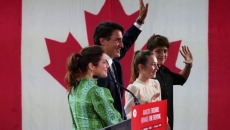OTTAWA - An expert on sexual misconduct says it would be dishonest for the Department of National Defence to promote the military as a positive place for women to work in a coming campaign after widespread reports to the contrary.
The Canadian Armed Forces, which has long struggled to boost the number of women in its ranks, hopes to have them represent one-quarter of members by 2026.
That figure now sits at around 15 per cent, and an internal study suggests the department needs to recruit around 3,500 women each year to meet its goal.
While recruiting more women poses a challenge, the military has been rocked in the last year by public reports of sexual misconduct allegations, including against its most senior officials.
The complaints of widespread inappropriate behavior prompted Prime Minister Justin Trudeau to say it was clear military complainants didn't feel they had a place to report their experiences. He asked a former Supreme Court justice in April to investigate the issue, more than six years after an earlier report on the matter.
That same month, a consulting company delivered a report based on focus groups with women aged 18 to 35 to test advertisements ahead of a recruitment campaign set to roll out soon.
An executive summary of the report posted to a federal website details how participants were shown storyboards with different advertising concepts that looked into the lives of women in the air force, navy and army.
The images showed women travelling, mothers being able to strike a work-life balance with their families and opportunities to serve in non-traditional environments.
"I think they have to deal with a cultural issue before they can sort of make any claims in recruitment campaigns," said Megan MacKenzie, a chair in international law and human security at Simon Fraser University who studies sexual misconduct in the military.
"It's dishonest to recruit women into an institution at this point with such positive messaging when so many women and men who have experienced sexual misconduct are saying they don't feel safe in the institution."
The report includes summaries of the feedback participants gave about the ads they saw, including one where they saw the message as one of women being accepted in the military if they were lesbian, gay, bisexual, transgender or queer.
"Participants felt the ad did not address concerns about LGBTQ in the military, and to a few it seemed contradictory to what recent news headlines communicate about sexual abuse in the forces," it reads.






